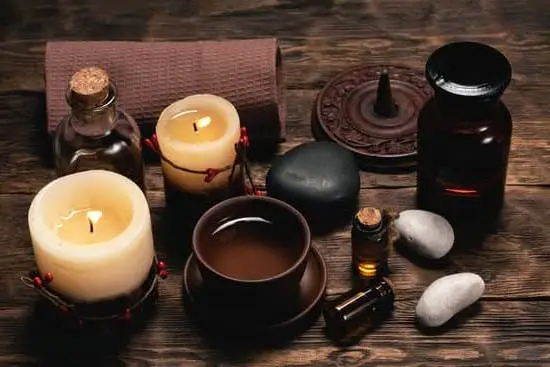Aromatherapy is a holistic healing treatment that uses natural plant extracts to promote health and well-being. An important question that many individuals ask is: does aromatherapy stress relief work? Aromatherapy has been used for centuries as a way to reduce stress, anxiety, and promote relaxation. In this article, we will explore the basics of aromatherapy, how essential oils interact with the brain, common essential oils for stress relief, and the benefits of using aromatherapy for stress management.
One of the key aspects of understanding aromatherapy is the science behind it. Essential oils have been found to interact with the brain and nervous system in ways that can impact emotions and mood. By understanding this interaction, we can gain insight into why aromatherapy might be an effective method for managing stress.
In addition to discussing the scientific aspects of aromatherapy, we will also explore common essential oils used for stress relief such as lavender, chamomile, and more. These oils have been traditionally used for their calming properties and are often recommended for individuals looking to manage their stress levels naturally. Stay tuned as we delve deeper into how these essential oils can benefit your mental health and overall well-being.
The Science Behind Aromatherapy
Aromatherapy has been used for centuries as a natural way to promote relaxation, reduce stress and improve overall well-being. But how exactly does aromatherapy stress relief work? The answer lies in the science behind how essential oils interact with the brain.
The Olfactory System and the Brain
When essential oils are inhaled, they stimulate the olfactory system, which is connected to the limbic system in the brain. The limbic system is responsible for emotions, memories, and arousal. This connection is what makes aromatherapy effective for managing stress and anxiety.
Chemical Compounds and Neurotransmitters
Essential oils contain chemical compounds that can have a direct impact on neurotransmitters in the brain. For example, lavender essential oil contains linalool, which has been shown to have calming effects on the central nervous system. Chamomile essential oil contains compounds that can help reduce anxiety and promote relaxation.
Mood Regulation and Stress Response
By interacting with the brain, essential oils can help regulate mood and influence the body’s stress response. This can result in a feeling of calmness, reduced anxiety, and an overall sense of well-being. The power of scent to influence emotions and behaviors has been recognized for centuries, and modern scientific research continues to explore these connections.
Understanding how essential oils interact with the brain provides valuable insight into why aromatherapy stress relief works for so many people. Through its ability to influence mood, regulate stress responses, and promote relaxation, aromatherapy offers a natural and holistic approach to managing stress and enhancing overall well-being.
Common Essential Oils for Stress Relief
Aromatherapy has long been used as a natural method for stress relief, and it often involves the use of essential oils derived from plants. These essential oils are believed to have therapeutic properties that can help reduce stress and anxiety, among other benefits.
Common essential oils for stress relief include:
- Lavender: Lavender oil is one of the most popular essential oils for stress relief due to its calming and relaxing effects. It is often used to promote sleep and reduce anxiety.
- Chamomile: Chamomile oil is known for its soothing and anti-inflammatory properties. It is commonly used to ease feelings of tension and promote relaxation.
- Bergamot: Bergamot oil is believed to have mood-boosting properties and may help alleviate symptoms of anxiety and depression.
- Ylang Ylang: Ylang ylang oil is often used for its uplifting and calming effects, making it a popular choice for reducing stress and promoting emotional well-being.
In addition to these essential oils, there are many others that are commonly used for stress relief, each with their own unique benefits and aromas.
When using essential oils for stress relief, it’s important to consider how they will be applied or diffused. Some people choose to inhale the aroma directly from the bottle or apply a few drops to a tissue or handkerchief.
Others may opt for topical application by diluting the essential oil with a carrier oil and applying it to the skin. Diffusing essential oils into the air using a diffuser is another popular method that allows the aroma to be spread throughout a room.
While individual experiences with aromatherapy can vary, there is evidence from research studies that supports its potential benefits for stress relief. Whether through inhalation, topical application, or diffusion, aromatherapy with essential oils can be an effective tool in managing stress and promoting relaxation.
The Benefits of Aromatherapy for Stress Management
Aromatherapy has been used for centuries as a natural way to manage stress and promote relaxation. The use of essential oils in aromatherapy can have a positive impact on mental well-being, helping to reduce anxiety and enhance relaxation. Here are some of the benefits of aromatherapy for stress management:
- Reduction of Anxiety: Certain essential oils, such as lavender and chamomile, have been shown to have calming effects on the mind. When inhaled or applied topically, these oils can help to reduce feelings of anxiety and promote a sense of calm.
- Enhanced Relaxation: Aromatherapy can help individuals unwind and relax after a long day. Oils like bergamot and ylang-ylang are known for their ability to promote relaxation and ease tension in both the body and the mind.
- Improved Mood: Aromatherapy has been found to have mood-lifting properties, with certain essential oils helping to uplift spirits and improve overall emotional well-being.
In addition to these benefits, aromatherapy can also be used as a complementary therapy alongside other stress management techniques such as meditation, yoga, and exercise. By incorporating aromatherapy into a holistic approach to stress relief, individuals may experience even greater benefits in managing their stress levels.
Overall, while individual responses to aromatherapy may vary, many people have found it to be an effective tool for reducing anxiety and enhancing relaxation. With continued research and personal testimonies supporting its benefits, there is strong evidence that aromatherapy does indeed work as a form of stress relief for many individuals.
How to Use Aromatherapy for Stress Relief
Aromatherapy is a popular method for stress relief that involves using essential oils to promote relaxation and reduce anxiety. There are several ways to use aromatherapy for stress relief, including inhalation, topical application, and diffusion. Each method has its own benefits and can be tailored to individual preferences and needs.
Inhalation is one of the most common methods of using aromatherapy for stress relief. This can be done by adding a few drops of essential oil to a bowl of hot water and inhaling the steam, or by using a diffuser to disperse the scent throughout a room. Inhaling essential oils can have immediate effects on mood and can help promote relaxation and reduce feelings of stress and anxiety.
Topical application is another effective way to use aromatherapy for stress relief. Essential oils can be diluted with a carrier oil, such as coconut or jojoba oil, and applied directly to the skin through massage or gentle rubbing. The aroma of the essential oil can have a calming effect, while the act of massage itself can also help relieve tension and stress in the body.
Diffusion is a convenient method of using aromatherapy for stress relief that involves dispersing essential oils into the air using a diffuser. This allows the scent to fill an entire room, creating a relaxing atmosphere that can help promote feelings of calmness and well-being. Diffusers come in various types, including ultrasonic, nebulizing, heat-based, and evaporative diffusers, offering options for different preferences and needs.
| Aromatherapy Method | Benefits |
|---|---|
| Inhalation | Immediate effects on mood; promotes relaxation; reduces stress and anxiety |
| Topical Application | Calming effect on mood; relieves tension and stress in the body |
| Diffusion | Creates a relaxing atmosphere; promotes feelings of calmness |
Research and Studies on Aromatherapy and Stress Relief
Aromatherapy has been used for centuries as a holistic approach to health and wellness. But what does science say about its effectiveness in relieving stress? Research and studies have been conducted to understand the impact of aromatherapy on stress management, and the results are promising.
One study published in the Journal of Alternative and Complementary Medicine found that inhaling lavender essential oil can significantly reduce levels of cortisol, the stress hormone, in the body. Another study from the International Journal of Nursing Practice concluded that aromatherapy massage with essential oils like chamomile and lemon can improve mood and reduce anxiety in patients with chronic pain.
Furthermore, research from the University of Maryland Medical Center suggests that aromatherapy using certain essential oils, such as bergamot and frankincense, can help alleviate symptoms of depression and promote relaxation. These findings support the use of aromatherapy as a complementary approach to traditional stress management techniques.
In summary, scientific research indicates that aromatherapy does indeed have potential as a stress relief tool. The use of specific essential oils has shown to positively impact mood, reduce anxiety, and enhance relaxation. However, more extensive research is needed to fully understand the mechanisms behind aromatherapy’s effects on stress relief.
Personal Testimonies
Aromatherapy has been used for centuries as a natural way to promote relaxation and reduce stress. Many individuals have reported positive experiences with aromatherapy, claiming that it has helped them manage their stress levels and improve their overall well-being.
Aromatherapy in Daily Life
Many people incorporate aromatherapy into their daily routines to help alleviate stress. Whether it’s through the use of essential oil diffusers, aromatic bath oils, or scented candles, individuals find that the pleasant aromas help create a calming environment, which can be particularly beneficial after a long day at work or during times of heightened anxiety.
Stress Relief in Specific Situations
In addition to daily use, some individuals turn to aromatherapy in specific situations where they may experience heightened stress. For example, using lavender essential oil before bedtime can promote relaxation and improve sleep quality. Others may find that inhaling chamomile essential oil helps them stay calm during a stressful workday. These anecdotal experiences showcase the potential benefits of aromatherapy for stress relief in various contexts.
A Personal Perspective
For many individuals, personal testimonies serve as powerful evidence of the effectiveness of aromatherapy for stress relief. By hearing about real-life experiences with these natural remedies, others may feel more inclined to give aromatherapy a try. While individual responses to aromatherapy may vary, it is clear that many people have found relief from stress through the use of essential oils and other aromatic products.
By exploring these personal testimonies, we gain insight into how different individuals have successfully integrated aromatherapy into their lives as a tool for managing stress. These firsthand accounts offer valuable perspectives on the potential benefits of using aromatherapy for stress relief and contribute to the ongoing conversation about its effectiveness.
Conclusion
In conclusion, the use of aromatherapy for stress relief has been met with a combination of skepticism and enthusiasm. While many have found relief through the use of essential oils such as lavender and chamomile, the scientific evidence supporting its effectiveness is still inconclusive. The interaction between essential oils and the brain is complex, and more research is needed to fully understand how aromatherapy impacts stress levels.
Despite the lack of conclusive scientific evidence, personal testimonies offer insight into the potential benefits of aromatherapy for stress relief. Many individuals report feeling calmer, more relaxed, and less anxious after using essential oils in various forms such as inhalation, topical application, or diffusion. These real-life experiences cannot be discounted and suggest that there may be some merit to incorporating aromatherapy into a holistic approach to stress management.
Ultimately, while aromatherapy shows promise as a complementary method for stress relief, it should not be viewed as a standalone solution. It can be used in conjunction with other stress-relief techniques such as exercise, mindfulness practice, and therapy. As with any alternative therapy, it is important to consult with a healthcare professional before using aromatherapy for stress management. More research is needed to fully understand the potential and limitations of aromatherapy for stress relief.
Frequently Asked Questions
How Effective Is Aromatherapy for Stress?
Aromatherapy can be effective for stress relief as certain essential oils, such as lavender and chamomile, have calming properties that can help reduce stress and anxiety. The inhalation of these scents can promote relaxation and a sense of well-being.
Does Aromatherapy Work for Anxiety?
Aromatherapy has been found to work for anxiety for some individuals. Certain essential oils, such as bergamot and rose, are believed to have anxiolytic effects that can help alleviate symptoms of anxiety. When used in conjunction with other relaxation techniques, aromatherapy may be beneficial in managing anxiety.
How Effective Is Aromatherapy?
The effectiveness of aromatherapy varies from person to person, but many individuals find it to be helpful for promoting relaxation and reducing stress and anxiety. While more research is needed to fully understand its mechanisms of action, aromatherapy is generally considered to be a complementary therapy that can support overall well-being.

Are you looking for a natural way to improve your health and wellbeing?
If so, aromatherapy may be the answer for you.





